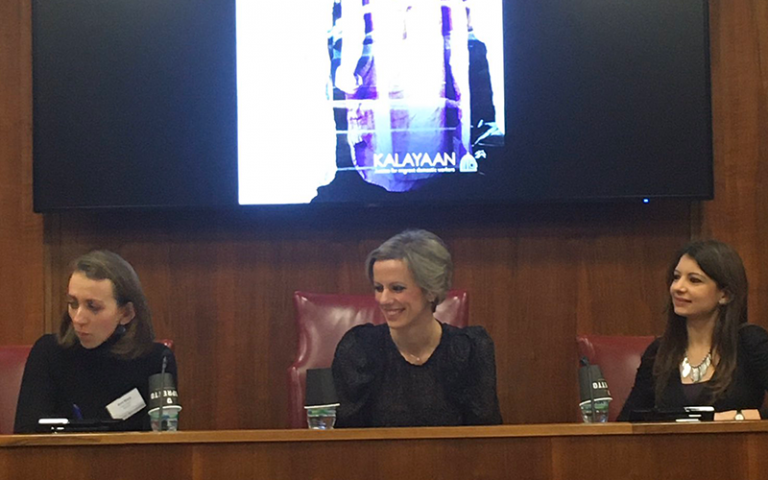The rights of migrant domestic workers in the UK
11 February 2020
The event marked the launch of a report ‘Dignity, not Destitution: The Impact of Differential Rights of Work for Migrant Domestic Workers Referred to the National Referral Mechanism’.

On Monday the 10th of February, UCL Faculty of Laws hosted an event on the rights of migrant domestic workers in the UK, co-organised by Professor Virginia Mantouvalou (Professor of Human Rights and Labour Law) and Natalie Sedacca (PhD student and Teaching Fellow) of UCL Laws, together with the NGO Kalayaan.
The event marked the publication of the Report ‘Dignity, Not Destitution’ by Kalayaan in collaboration with UCL Laws. The speakers were Natalie Sedacca of UCL Laws and Avril Sharp of Kalayaan (co-authors of the Report), Nina Rathbone-Pullen (Partner at Wilson Solicitors), and three migrant domestic workers who shared their experience with the audience. The event, which was chaired by Professor Virginia Mantouvalou (UCL Laws and Trustee of Kalayaan), included a pre-recorded message by the UN Special Rapporteur on Contemporary Forms of Slavery, Urmila Bhoola. It was attended by students, civil society, domestic workers, journalists, practicing lawyers, academics and others.
The panellists discussed the restrictive Overseas Domestic Workers visa regime, which is normally limited to a six month non-renewable period, making it very difficult for workers to change employer. They focused in particular on the challenges for those migrant domestic workers who are in the National Referral Mechanism (NRM), an administrative system for recognition of status of victim of 'modern slavery’. These workers under the NRM often do not have the right to work while the decision on their status is pending, and have to survive on £35 a week for months or years. The Report called for a right to work for all migrant domestic workers under the NRM.
Natalie Sedacca said: ‘The launch was an excellent way to mark the publication of the report, which it has been a real privilege to work on alongside Kalayaan. The domestic workers who took part in the event – like all those interviewed for the report – spoke powerfully of their experiences. There is a compelling case for extending the right to work beyond the limited and quite arbitrary circumstances in which it currently applies, and I hope that the voices of these workers will be heard.’
Professor Virginia Mantouvalou said: ‘I am delighted that we had the opportunity to give a voice to migrant domestic workers through the Report and through our event at UCL. It was a moving and powerful evening. We hope that policy-makers will look closely at the findings of the Report and recognise the right to work for all domestic workers under the NRM.'
Further reading
Kalayaan Report ‘Dignity, Not Destitution’
Natalie Sedacca, 'Migrant Domestic Workers and the Right to a Private and Family Life', (2019) 32 Netherlands Quarterly of Human Rights 288
Virginia Mantouvalou, ‘“Am I Free Now?” Overseas Domestic Workers in Slavery’, (2015) 42 Journal of Law and Society 329
Financial Times - 'Behind closed doors: modern slavery in Kensington'
 Close
Close

